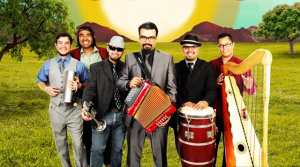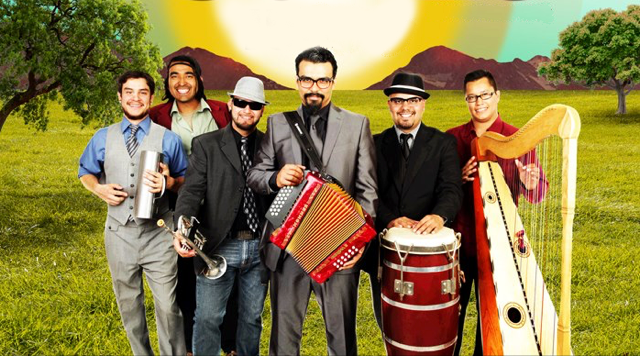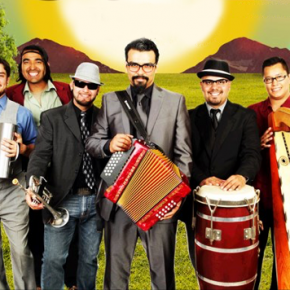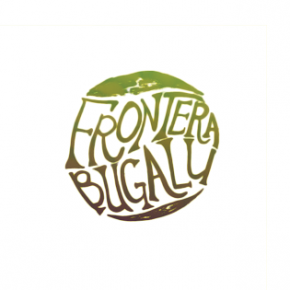 Frontera Bugalu crosses boundaries with their diverse blend of music. They celebrate border musicians such as Rigo Tovar and Latin American genres like Son, Mambo and Cumbia.
Frontera Bugalu crosses boundaries with their diverse blend of music. They celebrate border musicians such as Rigo Tovar and Latin American genres like Son, Mambo and Cumbia.
Support Frontera Bugalu to make their second album “Consejos del Pueblo“:
https://www.indiegogo.com/projects/frontera-bugalu-s-2nd-album-consejos-del-pueblo#/
Listen to “Oscuridad”
Here’s an old Fusion Mag interview with Kiko Rodriguez, lead singer of Frontera Bugalu:
How long have you been in Frontera Bugalu?
I think we’re going on almost two years now.
Can you tell me where it was started?
It was started here in the summer of 2009 in El Paso, TX.
Who started it and where did the name come from?
It was a project I had in mind. With my previous band we had been doing a lot of rock ‘n roll. This band was more about doing traditional music, especially salsa, mambo and cumbia. It was kind of my idea when I got to town I began to look for musicians and put it together.
What do you think your band brings to the genre?
I think we’re doing mainly roots cumbia, what I call roots cumbia. It’s not what you would hear on the radio. It’s not pop cumbia, just like in other genres of music. What we do is a little more underground, more traditional. What we’re trying to do is bring back the more tribal and traditional elements of Latin dance music before it got kind of modernized with all the modern technology and stuff. That’s what I think we’re trying to do with our project.
You are trying to stay away from the pop aspect of it but it seems that you have a really good tap on the community here. Every time you have a show, you have a really good response, people come out and they enjoy it. What does that say to you about what you’re trying to do?
Well that was the trick; to do something that is still appealing for everyone; something that we can all recognize in our generation and mix in some of the stuff that was heard like a hundred years ago. It’s a creative process of mixing the two elements and making it something for now. I think the difference is we have a lot of original songs now. They use the same style; the same arrangements in terms of composition but it has our own lyrics and their own take of what’s happening right now and things that are happening in our generation with a few twists and turns that you can tell it was things that influenced us when we were growing up.
You’re promoting your new album. Can you give us some information on that?
The new album, we recorded it this past summer after about a year and a half of playing. We developed about 8 tracks and we recorded them over the summer. We’re barely going to do the CD release November 25th. It’s the first time for this project so we’re excited!
Does it have a theme? What is it about?
It doesn’t really have a theme. It’s self-titled. The general theme of the band is sort of tropical music mixed in with border music. There were a lot of artists that lived along the border that were from tropical areas like Rigo Tovar and The Valley of Texas and all that. So, there is a lot of that influence but then there is that more edgy, kind of desert feel that comes from the northern part of the border like El Paso and Tijuana.
Why is that so important to your music? What drives you to incorporate all these styles and themes?
For me, I think it happens in all music styles but in Latin music, I think people try to pigeon hole it as its only this one thing; it’s only salsa, it’s only cumbia. For us, Latin music is much bigger than that. It’s worldwide; it reaches I don’t know how many countries in Latin America and they’ve all put their own stamp on it; they’re own style on it. I think we need to grow our conception of what Latino culture is and what Latino music is in general. The band tries to do that by mixing things that you recognize when you were growing up with things you haven’t heard yet and making that connection.
I think you guys are really strong musicians, how often do you guys practice?
The schedules can get really intense. Minimal, there is one rehearsal a week, sometimes two, sometimes three depending on what’s happening. On top of that, there’s two or three shows a week or on a weekend. Sometimes there is a week off but mainly it’s very consistent. What drives everyone is trying to do right by this kind of music. It demands a lot of respect and a lot of study and I think that people in the band value that and they take pride in doing it. The reactions from the crowds are always really good. So, it just feeds itself. I think as a band, our objective is to make people feel good; make people feel good about who they are culturally and to do a good job music wise.
It seems like the scene here fluctuates. Sometimes the scene here is pop heavy, sometimes its rock heavy. Right now, it seems to me it’s the most diverse that I’ve ever seen it. Where do you think that will lead to?
I have hope that it’s going to continue to develop. Where we are now is a result of what people were doing ten years ago. It’s a combination of all the musicians that have been doing it with all the new energy of the new bands. I think it’s going to be really diverse. I do get scared of it becoming like every other town. I don’t think we should mimic anybody else. We should have our own voice, our own sound. It’s okay to learn from other places and to definitely bring in bands from other places. But I think El Paso should have its own voice and I hope that’s where it will go.
Txt: Alex Duran.





